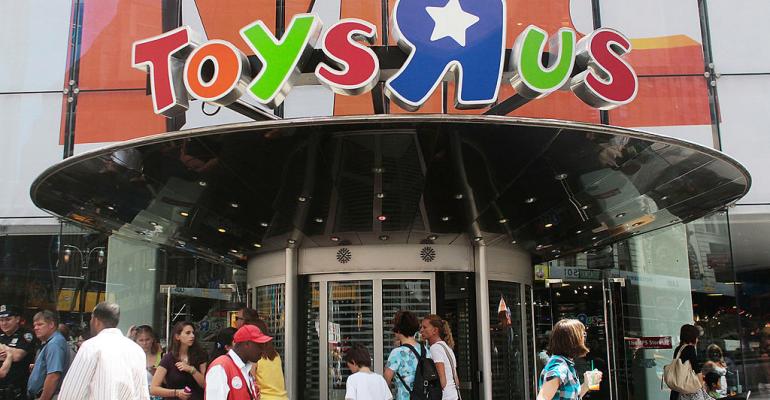(Bloomberg)—Some Toys “R” Us stores could turn out to be worthless to commercial mortgage-bond investors.
As many as 26 of the weakest properties in a 2016 commercial mortgage-bond deal secured by 123 Toys “R” Us stores may have little or no value, Deutsche Bank AG analysts Ed Reardon and Simon Mui wrote in a note Wednesday. The stores backing the $512 million bond had an estimated value of around $618 million in 2016 if they were to be vacated and re-leased. But that figure could be one-third lower now because retailers’ revenues have been dropping and more have been filing for bankruptcy.
The properties are probably subject to a new appraisal following the Wayne, New Jersey-based toy store’s bankruptcy filing in September 2017, based on the securities’ offering documents, the analysts wrote. An appraised value of less than $495 million could lead to the most junior bondholders losing control of servicing decisions or taking losses, the analysts wrote.
Toys “R” Us sold the bonds in October 2016, less than a year before it filed for bankruptcy. The largest portion of the offering received AAA ratings from S&P Global Ratings and Morningstar Credit Ratings. The $63 million Class F piece of the deal, which would be the first to take losses, had junk ratings.
Such ‘Flux’
The analysts estimated a new appraisal may value the properties at $407 million. Adding difficulty to valuations are the varying types of store locations -- including outside malls, strip centers and standalone locations -- and a retail industry “in such a state of flux.”
Real estate investment trusts including Retail Properties of America Inc., DDR Corp. and Kimco Realty Corp. are candidates to purchase some of the spaces in primary and secondary markets because many already operate similar properties, the analysts said. Local real estate investors may be the best option for lower-value lots, but could also end up buying mid-tier spaces if national buyers pass.
Potential replacement tenants "have significant negotiating power" when leasing the spaces, the analysts said. Some loans in the deal have other large vacancies nearby, or other weak tenants that may close stores. In some cases, potential replacement tenants like Michaels Cos. and Dick’s Sporting Goods Inc. already have stores near or in the same shopping strip where a Toys “R” Us is closing, meaning they’re unlikely to step in and lease.
"Buyers of these properties face massive execution risk," the analysts said, noting that owners of the spaces may face lower-than-expected rents, more retailer defaults or a long leasing process.
To contact the reporter on this story: Claire Boston in New York at [email protected] To contact the editors responsible for this story: Nikolaj Gammeltoft at [email protected] Dan Wilchins, Kenneth Pringle
COPYRIGHT© 2018 Bloomberg L.P

